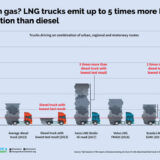IEA study unveils key role for trucks in global oil-demand growth
Improving the efficiency of road-freight transport is critical to reducing the growth in oil demand, carbon emissions and air pollution over the next decades, according to the International Energy Agency’s (IEA) latest report, The Future of Trucks: Implications for energy and the environment.
Trucks are a major contributor to the growth in transport-fuel consumption, as well as rising carbon dioxide and air pollutant emissions. But the sector gets far less attention and policy focus than passenger vehicles. Only four countries have energy-efficiency standards for heavy trucks, compared with about 40 countries with passenger-vehicle standards.
Yet the growth in oil demand from trucks has outpaced all other sectors – including passenger cars, aviation, industry and petrochemical feedstocks – since 2000 and contributed 40% to global oil demand growth, a similar contribution as cars. Currently, trucks account for almost a fifth of global oil demand, or around 17 million barrels per day (bpd), equivalent to the combined oil production of the United States and Canada. It also accounts for about half of global diesel fuel use, a third of all transport-related carbon emissions and a fifth of NOx emissions, a key air pollutant.
The main drivers of oil demand from trucks today are the United States, the European Union and China, while India is emerging as a growing contributor. Economic growth, particularly in Asia, will continue to boost oil demand from trucking in the future.
Trucks are a key enabler of global economic activity and play an essential role in delivering goods or commodities across every point of the economic value chain, from production to sale.
But if no action is taken, oil demand from road freight is projected to grow by 5 million bpd by 2050, or around 40% of the projected increase in global oil demand during that period. This growth is expected to lead to a significant increase in carbon dioxide emissions of nearly 900 million tonnes through 2050, or about the same level of emissions growth as from coal use in the power and the entire industry sector combined.
In an effort to address this rise in diesel fuel demand and emissions, the IEA describes a more sustainable policy pathway for truck transport that could reduce energy use in road freight by 50% and emissions by 75% by 2050.
“For far too long there has been a lack of policy focus on truck fuel efficiency. Given they are now the dominant driver of global oil demand, the issue can no longer be ignored if we are to meet our energy and environmental objectives” said Fatih Birol, IEA executive director. “Our study highlights the gains that are possible from tighter truck fuel efficiency standards and sets out other cost-effective steps to modernise freight transport.”









